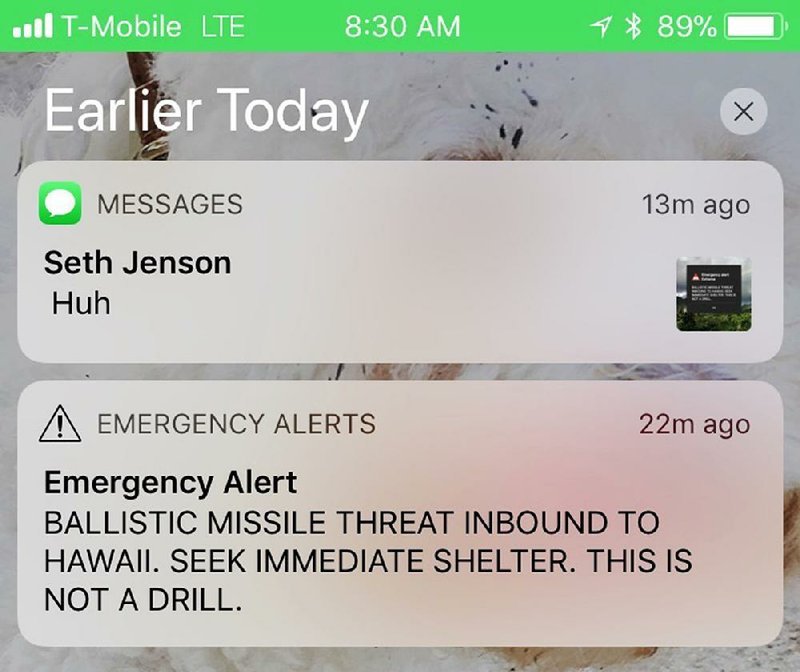HONOLULU -- When Jonathan Scheuer got an alert on his phone of a ballistic missile headed for Hawaii, he and his family didn't know what to do. They went to their guest bedroom, then decided it would be safer on the ground floor of their Honolulu home.
"What do we do?" he wondered. "Where do we go?"
People should immediately seek shelter in a building "or other substantial structure," once an attack-warning siren sounds, according to guidance the state distributed previously. The state recommends having 14-day survival kit of food and water.
Residents and tourists alike remained rattled after the mistaken alert was blasted out to cellphones across the islands with a warning to seek immediate shelter and the ominous statement: "This is not a drill."
"Clearly there is a massive gap between letting people know something's coming and having something for them to do," Scheuer said. "Nobody knew what to do."
The erroneous warning was sent during a shift change at the Hawaii Emergency Management Agency when someone doing a routine test hit the live alert button, state officials said.
That employee has been reassigned to a job without access to the warning system amid an internal investigation, agency spokesman Richard Rapoza said Monday. No other personnel changes have been made, he said.
Lisa Foxen, a social worker and mother of two young children in east Honolulu, said the best thing to come out of the scare was that it pushed her family to come up with a plan if there is a real threat.
"I kind of was just almost like a deer in headlights," she said. "I knew what to do in a hurricane. I knew what to do in an earthquake. But the missile thing is new to me."
The blunder that caused more than a million people in Hawaii to fear that they were about to be struck by a missile fed skepticism about the government's ability to keep them informed in a real emergency.
"My confidence in our so-called leaders' ability to disseminate this vital information has certainly been tarnished," said Patrick Day, who sprang from bed when the alert was issued Saturday morning. "I would have to think twice before acting on any future advisory."
Officials tried to assure residents there would be no repeat false alarms. The agency changed protocols to require that two people send an alert and made it easier to cancel a false alarm -- a process that took nearly 40 minutes.
The error sparked a doomsday panic across the islands. Parents clutched their children, huddled in bathtubs and said prayers. Students bolted across the University of Hawaii campus to take cover in buildings. Drivers abandoned cars on a highway and took shelter in a tunnel. Others resigned themselves to a fate they could not control and simply waited for the attack.
The 911 system for the island of Oahu was overwhelmed with more than 5,000 calls. There were no major emergencies during the false alarm, Mayor Kirk Caldwell said.
President Donald Trump said Sunday that the federal government will "get involved," but didn't release details.
An investigation into what went wrong was underway at the Federal Communications Commission, which sets rules for wireless emergency alerts sent by local, state or federal officials to warn of the threat of hurricanes, wildfires, flash flooding and to announce searches for missing children.
The false alarm triggered a broader discussion about national security at a time when North Korea has been flexing its muscles by launching test missiles and bragging about its nuclear capability. Its leader, Kim Jong Un, has also exchanged insults on Twitter with President Donald Trump about their arsenals.
People need to step back from questioning who pushed the button and why, and instead focus on military de-escalation, Scheuer said.
Rep. Tulsi Gabbard, a Hawaii Democrat, said officials should be held accountable for the "epic failure of leadership" behind the warning. She said the missile threat underscored the need for Trump to meet with Kim to work out differences without preconditions.
"The people of Hawaii are paying the price now for decades of failed leadership in this country" by setting "unrealistic preconditions," she said. "The leaders of this country need to experience that same visceral understanding of how lives are at stake."
Information for this article was contributed by Tom Strong of The Associated Press.
A Section on 01/16/2018
